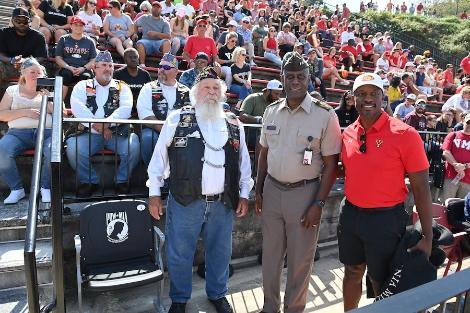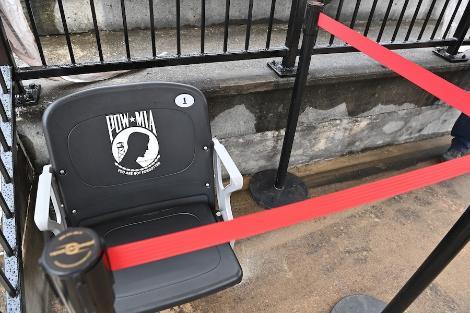Saving a Permanent Seat for POW/MIAs at VMI's Foster Stadium

LEXINGTON, Va. Sept. 23, 2024 — A POW/MIA Chair of Honor was dedicated in Foster Stadium at Virginia Military Institute before the football game against Norfolk State Saturday, Sept. 21, the day after National POW/MIA Recognition Day, which is the third Friday of September. These chairs are found all over the United States in stadiums, arenas, and government buildings. They are meant to represent those service members who are unable to fill them because of their sacrifices. They also serve as a tribute to the men and women who serve the country every day.
Jamaal Walton ’07, director of intercollegiate athletics, stated that installing the chair was the right thing to do. “It’s a no-brainer that it should be in our stadium, so when I learned that there was a way to do it, it made sense that it needed to reside here at VMI. This group is very important and leaving that seat open shows how we are always honoring those prisoners of war and missing in action.”
Twenty-six VMI alumni have been prisoners of war, and all alumni who were missing in action have been located. Col. Thomas H. Kirk Jr. ’50B, one of the most decorated living alumni who is a former POW, was highlighted at the dedication. Kirk, currently 95 years old, is originally from Portsmouth, Virginia, and now lives in Phoenix, Arizona.
During a Zoom interview recently, Kirk shared that upon graduating, he commissioned into the Air Force and became a pilot. He flew 50 missions during the Korean War, and extended his career into the Vietnam War. “I had become a colonel by that time, and I felt that as a career officer, I should be in the war, so I went to Vietnam and flew the F-105, a fighter-bomber. On my 67th mission over Hanoi, I was struck by anti-aircraft and my airplane caught fire. I dropped my bombs and completed the mission, but the controls froze, and I was forced to eject from 15,000 feet.”
Kirk landed in a pasture, unconscious. When he came to, he was surrounded by a group of Vietnamese men, women, and children who beat him mercilessly. “They would have killed me, but the Vietnamese army arrived and took me prisoner.” Kirk was taken to the Hanoi Hilton and kept there from October 1967 until his liberation in March 1973. “We were all tortured initially for military information, and treated very badly. Life in the camp was very difficult. We were totally isolated, never allowed outside. I was in a 7-by-8-foot masonry cell with three other people. Meals consisted of a couple bowls of soup a day and a piece of bread. I lost 100 pounds and got down to 90 pounds. After 14 months, I had an altercation with a guard, and was placed in solitary confinement for two years. I was later placed in a larger cell that held 50 people. That’s where I met John McCain, and we became friends. When the war ended in 1973, 591 of us came home from that POW camp.”
Kirk stayed in the Air Force eight more years and became the commander of a pilot training wing in Selma, Alabama. After that he was vice commander of an air base in Denver. He then went on to the United States European Command in Germany before retiring from the military.
Kirk said that having the POW/MIA chair installed at VMI means a great deal to him.
“It serves in reminding people when they come into Foster Stadium of those who served, sacrificed, were wounded or killed for our freedoms, and that young men and women are currently serving and defending our country. We should stop and reflect on the wonderful life we have here, and I hope that would encourage each cadet to a better student, a better person, and a better American.”
Kirk’s autobiography, “Hits, Wins and Misses-A Fighter Pilot’s Life Story,” may be purchased on Amazon.
Information on the breakdown of VMI classes post World War II and their staggered graduation dates may be found here.
Marianne Hause
Communications & Marketing
VIRGINIA MILITARY INSTITUTE
.svg)
.png)